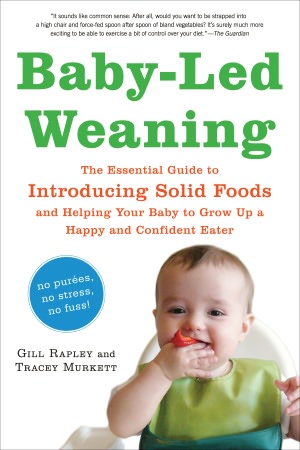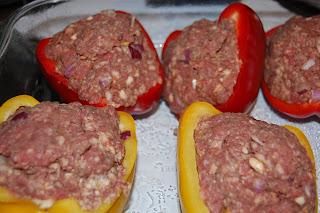 So, I recently read this book. When I say recently, I mean I read it today. Michael's six-month check-up is fast approaching, and our pediatrician said she thinks he will be good to go on starting fruits and veggies after it.
So, I recently read this book. When I say recently, I mean I read it today. Michael's six-month check-up is fast approaching, and our pediatrician said she thinks he will be good to go on starting fruits and veggies after it.My sister suggested this book (along with another one which I'll post about in due time). Over all it is very informative. I think I might have been supposed to get the other one, which has recipes and stuff, but c'est la vie. Anyway, it is very informative. It gives parents some really good ideas.
For example, I like the idea of letting Michael decide when he's ready to eat solids. That being said, we've already broken him in to rice cereal. The book says that starting with rice cereal really isn't necessary, but everyone does things differently!
Anyway, again.
I like the idea of letting Michael decide when he really wants to eat. Just because he's six months old doesn't mean he's necessarily ready to begin eating mushed up bananas or carrots or what have you. I like the idea of letting him do it on his own time, since he's done everything else on his own time as well. We were impatient for him to roll over, but he did when he was ready. I'm sure we'll be impatient for him to walk. We're already impatient waiting on his first words... but some day we'll be ready for things to slow down again... so I like the idea of letting him decide.
Another thing I liked was all the examples from parents. I loved reading stories of how other babies began eating... some early, some not so early. I like the idea of Clark, me, and Michael sitting down at a table and letting Michael try bits and pieces of things... like giving him a green bean to chew on or let him try some mashed potatoes. I also like the idea of not really having to spoon feed him.
All that being said, I'm pretty sure this book could have been summed up in a grand total of 100 pages instead of 226. It repeated A LOT of things. Even for a parent who had no idea what it meant to let your baby decide when to eat, and how to let him/her do that... it really just goes on.
Another point... is that I think the "traditional" way of feeding babies still proves a point. While the authors say that babies are self-feeders when it comes to BF (breast fed) babies, and interrupting that by spooning food into their mouths isn't fair to them... I think spoon feeding may help babies understand feeding beyond breast or bottle feeding. I'm not saying that babies should be given baby food from a jar (or homemade or whatever) until he/she is a year old, I'm just saying I do think there is nothing wrong with spoon feeding the baby in the very beginning. Now, the authors continuously say they are not saying there's anything wrong with spoon feeding... but then they go beyond that and seem to really try and rip the idea to shreds.
"Controlling how babies eat doesn't lead to better nutrition or better behavior-- in fact, it's more likely to lead to mealtime battles."
"Many of the eating problems that affect older children and their families have their roots in issues of control. Indeed, health professionals who work with these families commonly start by asking the parents to "give control back to the child." Maybe if this control isn't taken away in the first place, problems like these won't be as common."
"Many parents who spoon-feed their baby find that she isn't keen to eat, and they have to come up with ways of persuading her to accept different foods."
These are just a number of examples, and I'm not saying they don't have a point. What I'm trying to say is that the book is automatically assuming that all spoon-fed babies started eating too early, don't like to be spoon fed, are eating too much, and end up having eating problems later on. It doesn't seem to really take into account ALL situations to me... it just seems to be pushing their way of thinking.
The book also has very few limitations to what you should be giving your baby. It does preach out against salt, sugar, bran... and it gives reasons for these as well as others. But it continuously says that, basically, whatever your baby wants to eat you should let him/her explore and eat it. One example was a baby taking a piece of an older sibling's sandwich... which just doesn't seem like a good idea to me.
It mentions meat, for example. It gives ways of how to give it to your baby... like give them chicken on a bone so it's easier for them to hold. I mean... really? On Dr. Sears' site (here) it says that meat should be avoided for some time because babies have not learned to chew it. Now, this may be because he's assuming that the babies were simply spoon-fed... but I have a feeling it's because, I don't know, most babies at this age don't have teeth and therefore are just swallowing the meat and have a greater likelihood of choking on it.
It's not that I didn't like the book, or that I don't intend to follow any advice from it, or that it didn't make some wonderful points and suggestions. It's that it really seemed to be pushing the way of BLW and completely going against other ideas.
Maybe I have control issues. Maybe I like the idea of spoon-feeding Michael foods. Maybe I like the idea of not having to deal with a crazy mess right away. Maybe I like the idea of not having to worry too much that Michael's going to choke on something. Maybe I think that the book should have been not as long and held more details to BLW thinking rather than constantly saying that spoon-feeding is the root of all eating-evils. Maybe I didn't read it thoroughly enough to really get the idea behind it. Maybe, maybe, maybe.
What do you think?






























![EVERYTHING DELICIOUS [Chocolate Chip, Reese's Pieces, Caramel Bits] COOKIES](https://blogger.googleusercontent.com/img/b/R29vZ2xl/AVvXsEhN0JN5gXpCIeguPeoYvhSWYPziFbh_XIGlMhjxXZ_kM7u8HWDETKsq34xmbjbsG6R35JI_yB9yIHGsh3Qmk-KfDeQyQVVzQ4coOBEB2DuxR5GDOejMhK2aRdNq6tnHYcU8Kb4SxVy_EXQ/s72-c/cookies+1.JPG)


![Vegan [Banana PB] Fudge Brownies](https://blogger.googleusercontent.com/img/b/R29vZ2xl/AVvXsEj2EJfIWTEg0KAG4EqxVqulk3-POvu0aYJy95E6AAi257jqznFs6PzHmiLuR7N11XH88cfZbUjvJI_lZjAfW3jbRI3cahcqbHINC3HfVaMfxhiHFRo3Czk-FBwxy6tCAKtWeSMDBs9pidw/s72-c/DSC_0849.JPG)

